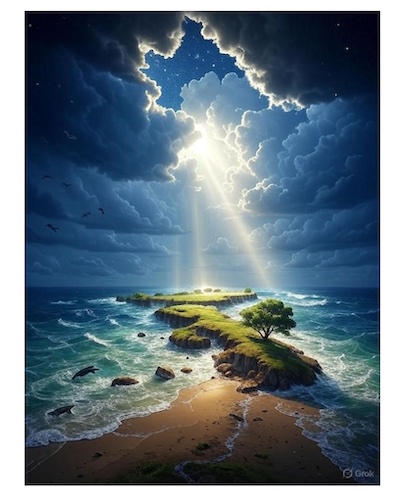
The Divine Light
At the break of dawn comes the Sun divine.
By its light I see, as I see it shine.
Then by dark and light comes the Son divine.
By His light I see, as I see Him shine!
Science tells us that approximately 14 billion years ago, there was nothing; no matter, and no energy—not even a single photon of light—complete and utter darkness. The Bible tells us the same story in Genesis.
[Author's Note:]I have taken the liberty of paraphrasing that story to make it clearer to all who may be reading it for the first time, hopefully without diminishing the tone and temper of the King James version of the "Greatest Story Ever Told."
In the beginning God created the heaven and the earth. At first, the earth was without form, and there was only the darkness of the void. And the Spirit of God commanded, "Let there be light;" and there was light. And God saw the light, that it was good: and God divided the light from the darkness, calling it the first Day—God's way of separating the epochs of time in His Creation.
And God said, "Let there be lights in the firmament of the heaven to divide the day from the night; and let them be for signs, and for seasons, and for days, and years; and let them be for lights in the firmament of the heaven to give light upon the earth;" and it was so. God made two great lights; the greater light to rule the day, and the lesser light to rule the night: he made the stars also. And God set them in the firmament of the heaven to give light upon the earth, to rule over the day and over the night, and to divide the light from the darkness: and God saw that it was good. And in the darkness and light came the second day.
And God said, "Let there be a firmament amid the waters, dividing the waters from one another." So, God separated the sky from the waters below and the waters above; and it was done. God named the firmament Heaven. And in the darkness and light came the third day.
Then God said, "Let the waters under the heaven be gathered together unto one place, and let the dry land appear;" and it was so. God called the dry land Earth; and the gathering of the waters He called the Seas: and God saw that it was good. Then God said, "Let the earth bring forth grass, the herb yielding seed, and the fruit tree yielding fruit after its kind, whose seed is upon the earth;" and it was so; and God saw that it was good. And in the darkness and light came the fourth day.
And God said, "Let the waters bring forth abundantly the moving creature that hath life, and fowl that may fly above the earth in the open firmament of heaven." God created great whales, and every living creature that moves, which the waters brought forth abundantly, after their kind, and every winged fowl after its kind: and God saw that it was good. God blessed them, saying, "Be fruitful, and multiply, and fill the waters in the seas, and let fowl multiply on the earth." And in the darkness and light came the fifth day.
And God said, "Let the earth bring forth the living creature after its kind, cattle, and creeping things, and beasts of the earth after their kind;" and it was so; and God saw that it was good. And God said, "Let us make man in our image, after our likeness." Then God created man in his own image, in the image of God, male and female. And God blessed them, and God said unto them, "Be fruitful, and multiply, and replenish the earth, and subdue it: and have dominion over every living thing that moves upon the earth;" and it was so. And God saw everything that he had made, and behold, it was very good. And in the darkness and light came the sixth day.
Thus, the heavens and the earth were completed, along with all the vast array of created beings and elements, from stars to angels. On the seventh day, God finished the work He had done, resting from all His labor. And God blessed the seventh day and made it holy.
How is it that this synopsis of how the universe was formed, as described by the Bible, can be so uncannily close to what science has taken thousands of years to uncover? I will leave you with a hint. Some of the greatest minds in history, such as Newton and Galileo, whose broad shoulders modern scientists stand on, were devout Christians.
To be continued...










